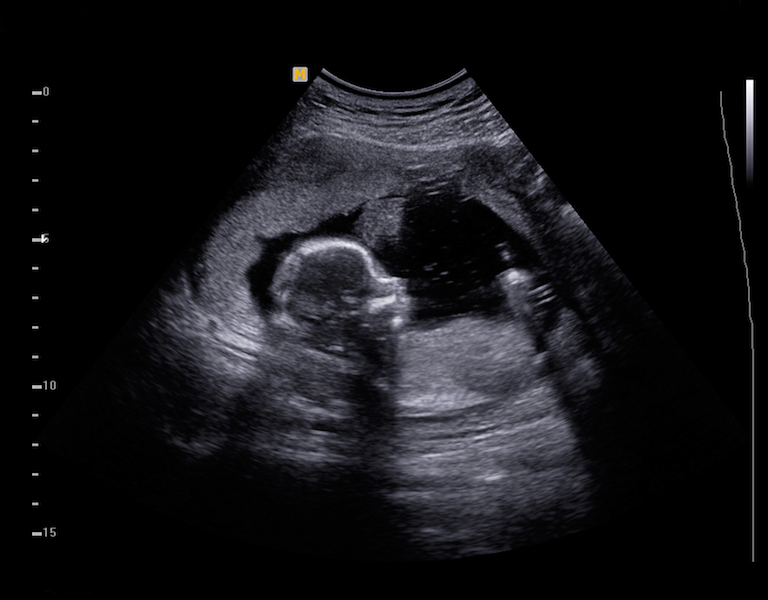By Fr. Shenan J. Boquet
So long as abortion activists can keep the public discussion of abortion restricted to their chosen language and talking points, they are safe. Who, after all, could disagree with such things as a woman’s “right to choose” or oppose her “reproductive rights”?
These sanitized, positive-sounding slogans are the secret weapon in the pro-abortion activists’ arsenal. While pro-lifers insist on addressing the violence done to the innocent child, who is killed in every abortion, or the actual, often-devastating physical and psychological consequences of abortion, abortion activists just as insistently steer the conversation back to vague, positive-sounding slogans.
Every so often, however, the truth about abortion explodes into the public square in a way that is extremely inconvenient for abortion activists. Often this occurs when some prominent figure unexpectedly opens up about the harsh reality of their own abortion experience. This leaves abortion activists scrambling to find ways to force the conversation away from these inconvenient facts, back towards their safe, clinical, propagandistic abstractions.
The most recent instance of this came in the form of popstar Britney Spears’ heart-rending revelations that she aborted her child after becoming pregnant with fellow superstar Justin Timberlake during their whirlwind teenage romance.
Britney Spears Opens Up About Her Abortion
Spears wrote that while the pregnancy was a “surprise” to her, “it wasn’t a tragedy. I loved Justin so much,” she wrote. “I always expected us to have a family together one day. This would just be much earlier than I’d anticipated.”
However, she added, “Justin definitely wasn’t happy about the pregnancy. He said we weren’t ready to have a baby in our lives, that we were way too young.” Rather than joining Spears in her joy at the good news of new life, Timberlake pushed Spears towards abortion. Ultimately Spears agreed.
In the end, she obtained abortion drugs (a “medical abortion”) and took them at home. The process, she writes, was the most “agonizing thing I have ever experienced in my life.” “If it had been left up to me alone, I never would have done it,” she added. “And yet Justin was so sure that he didn’t want to be a father.”
“I kept crying and sobbing until it was all over,” she continued. “It took hours, and I don’t remember how it ended, but I do, twenty years later, remember the pain of it, and the fear.”
Abortion’s Brutal, Hidden Reality
It’s no surprise that many celebrities are virulently pro-abortion. However, what is surprising is how many celebrity abortion testimonies refuse to be nearly as tidy as the abortion industry language suggests that they should be.
Take, for instance, Dancing with the Stars star Cheryl Burke. Burke, who is stridently pro-abortion, nevertheless describes her own abortion experience as “traumatic.” Or model Tess Holiday, who even while calling her abortion “necessary,” admits that it was “excruciating on many levels.”
Or hugely popular singer Nicki Minaj, who said that during her abortion, “I thought I was going to die… It was the hardest thing I’d ever gone through.”
Related: Post-Abortion Stress Syndrome: Parents Are Victims Too
All of these women continue to defend their abortions, often as “necessary” to advance their lucrative careers, often because they knew that the fathers of the children would not be around to help.
However, their brutally honest accounts also give the lie to the common talking points that abortion is “safe” and “easy”—a minor surgical procedure, or the simple taking of some drugs, that quickly “solves” a problem. In reality, abortion is profoundly invasive, going against every protective instinct that a new mother has towards her child.
As Spears’ testimony rightly highlights, so-called “medical abortions” are frequently physically painful, and psychologically scarring. Many women recount that, while being told that medical abortions are “easy,” in reality they experienced excruciating cramping, heavy bleeding, and myriad physical and psychological after-effects. Even more traumatic, is that many women are shocked when they expel the dead body of their unborn child, which turns out to be far more recognizably human than abortion activists had prepared them for.
As one woman wrote of her medical abortion experience:
I could see where the head and eyes had already started to form, that image is burned into my brain for the rest of my life.… Saying that experience ruined me would be an understatement. Everything in my life changed and I didn’t even know myself anymore. I had to deal with anxiety and depression and suicidal thoughts after I made this decision.… It was and will always be the biggest regret of my life.
The Inherent Sexism of the Sexual Revolution
One of the most astonishing, and yet sadly predictable, responses to Spears’ revelations was an article that appeared in USA Today. In the article, author Katie Camero first quotes Spears’ statement that the abortion was “one of the most agonizing things” she ever experienced, and that if it had been up to her, she wouldn’t have gone through with it.
Astonishingly, Camero then goes on to remark:
Spears’ statements underscore the benefits that male partners receive from having access to abortion care — an often overlooked aspect of reproductive health in light of Roe v. Wade’s downfall last year that, if ignored in society and politics alike, perpetuates the idea that abortion is solely a women’s issue.
The strangest thing about this statement, is that Camero apparently meant it unironically. That is, she truly intended to draw attention to the “benefits” that abortion brings to men, as an overlooked pro-abortion talking point!
Spears’ story is the quintessential story about a woman’s supposed “freedom of choice.”
Numerous studies have found that an enormous percentage of women feel that they were pressured into aborting their preborn children. This same scenario plays out countless times every day. Every day a selfish man uses the “freedom” his partner supposedly has, to coerce her into helping him evade responsibility for his choices.
However, this is not some overlooked “benefit” of legal abortion or ubiquitous contraception. This is the systemic subjection of women to the basest desires of irresponsible men.

Obviously, it is only women who can become pregnant. Importantly, however, this fundamental biological reality also has myriad other psychological implications. Because women are the only ones who can get pregnant, and because they are the only ones who can nurture a newborn child with their bodies, women have, historically speaking, been far less likely to desire or engage in casual sex. Instead, they have been far more interested in pursuing long-term stable relationships.
In Christian societies, the sexual vulnerability of women has been reflected in the common sexual mores that were accepted and enforced through formal legislation (e.g., laws banning easy divorce, or requiring paternal child support) or—more importantly—social taboos. Victorian society did not require young people to be accompanied by chaperones, or for men to declare their intentions openly and honorably, because they were “prudish” and controlling. All the thousand social conventions surrounding courtship, marriage, and family, were designed to honor and protect women and children, by educating and encouraging men to train and channel their natural desires towards nurturing and protecting, rather than exploiting.
The sexual revolutionaries, however, have made every effort to “level” the difference between men and women, proclaiming that they had conquered biology with such technologies as the birth control pill. Now that sex could be “consequence-free,” women could be as interested in casual, consequence-free sex as men.
Too many women took sexual revolutionaries at their word, only to learn—like Britney Spears— that immature, selfish men were only too happy to make use of these newfound freedoms to exploit them for pleasure, and then to dump them the minute the going got rough. Rather than the old rules, which tempered and directed men’s appetites, we have new rules designed to inflame and encourage men’s appetites, and to belittle women who refuse to play along. And then, to add insult to injury, women are told that if they are to be real women, they must champion the “freedoms” that allow men to use them in this way.
Pro-life Compassion
So many women have suffered in recent decades because they have bought the lies of the sexual revolutionaries and abortion activists. Our job as pro-lifers is two-fold: 1) to change the law and the cultural conventions so that once again they protect women and their preborn children, by supporting the family and training men in virtue, and 2) to meet the victims of the sexual revolution where they are, offering them the compassion and healing that they so desperately need.
The words that Spears uses to describe her abortion experience do not strike one as passing hyperbole. Her abortion experience clearly left her deeply wounded. The man she was prepared to spend her life with, and start a family with, thought it perfectly acceptable to pressure her into performing an act that, to this day, she views as “the most agonizing” thing she has ever done. The sense of betrayal is palpable.
It does not seem like idle speculation to wonder whether this abortion played some significant role in the widely-publicized difficulties of Spears’ life in the decades since. This is why the pro-life movement has poured so much of its resources into founding post-abortion healing services, reaching out to women who were victimized by the propaganda of abortion activists and the selfish exploitation of men, validating their pain and showing them the path towards forgiveness, healing, and peace.
As one post-abortive mom, the leader of a post-abortion healing ministry, wrote in an open letter to Spears, “There is nothing like the pain of choosing to end the life of your own child. People say abortion is not something you’ll regret; we’re told it’s the easy, consequence-free answer to what our culture views as ‘a problem.’ But those of us who have experienced this nightmare know that isn’t true.”
Tori Shaw continues:
Like you, I spent years and years never speaking about my abortion. I tried to numb myself with drugs and alcohol, suffered with depression and anxiety, allowed people to treat me terribly, sought love and affection in all the wrong places, and questioned my worth constantly. I got very good at wearing a fake smile and pretending I was fine, but deep down, I was broken and raw.
However, recounts Shaw, “When I finally began talking about my abortion, after 17 years of hiding, I was able to find healing and freedom in Jesus Christ. As I allowed Him to restore my heart, He began using my story to help others find that same healing.”
From Shaw’s website, Not Forgotten Ministries
“He wants that same healing for you, Britney,” concluded Shaw. “Abortion wasn’t the right choice for us to make, but because of God’s great love for us, we are forgiven through Jesus Christ. God is not angry with us, and our babies do not hate us, and we do not have to fear punishment. If we allow Him to, God will make something beautiful out of our biggest mistake.”
Today, let us take a moment to pray for all post-abortive women, that they may find the confidence to openly confess their abortion, and accept the unconditional love and forgiveness of God. And let us pray that God will raise up a new generation of men who will reject the lies that the sexual revolution has told them, instead embracing the kind of self-sacrificial love to which they are called.
This article has been reprinted with permission and can be found at hli.org/2023/10/britney-spears-brings-the-brutal-reality-of-abortion-into-the-light/?utm.
